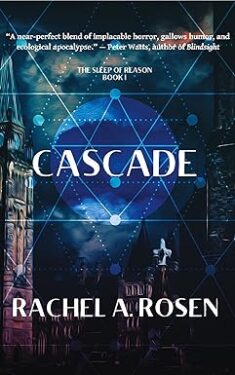 Cascade
Cascade The Sleep of Reason Book #1
Magical Realism, Dystopian Science Fiction,Dark Fantasy Horror
The BumblePuppy Press
June 15, 2022
Kindle
418
Amazon
In the wake of a worsening climate crisis, magic runs rampant and demons roam across the Canadian prairies. A long-dead god stirs in the Pacific Ocean, while the wilderness is choked by invasive, screaming grass.
The Cascade has shattered political stability, leaving a scandal-plagued government clinging to power in Ottawa. As catastrophe looms ahead, a precognitive rainman, Ian Mallory, stands between run-of-the-mill corruption and a nightmarish, dystopian future. It is up to a diverse and unlikely band of activists, scientists, journalists, and one underpaid, emoji-spell wielding intern to save their beleaguered country from its own worst impulses.

Review By Sherry Perkins
Member of the Paranormal Romance Guild Review Team
“Few disasters happen all at once.”— Cascade
Cascade starts with a map. A map of North America. I like maps. They are especially helpfulwhen what we’re talking about is the new North America. I also find it helpfulwhen the story is divided into component books or major chapter headings. It’s how you know a point of view changes or something important is coming. But with dystopian novels, book divisions also let you take a welcomed break—a necessary breather before everything goes to hell in a handbasket which, of course, it always does.
If the component book titles hadn’t essentially told the rest of tale, the introductory paragraphs would have. Each introduction is written by one of the principal characters. Book 1 is titled “The Blip,” Book 2 is “The Devil’s Waltz,” and Book 3 is “Like This but Worse.”
Cascade is a multiple point of view narrative. There are scientists, environmentalists, photojournalists, politicians—all with their own agenda, all complicated by the magic that inhabits them. Tobias is the intrepid reporter. Jonah, Ian, and Eric are career and possibly dishonest politicians. Sujay is the political intern stuck in the middle with duties as otherwise assigned (mostly public relations nightmares), and Blythe is an environmentalist who may or may not have seen the Cthulhu in this cautionary tale of catastrophic environmental change, the subsequent denials, and political machinations with its expected apocalyptic outcome. What is unexpected was the barrage of profanity, invectives, and vehemence—something I’d not necessarily associated with Canada, the story’s locale. However, it was an appreciable change and fun. Quote worthy too. In fact, Cascade had the most memorable quotes I’d seen in a while. One line even addresses the meme of Canadian politeness: “…it was orderly, a very Canadian kind of apocalypse.”
Rosen writes in a familiar style with lots of contemporary references. It’s easy to become invested in the characters. But you can tell Rosen is the real activist here, unabashedly. It’s cool though, since embedded within the supernatural tale, Cascade is a timely interpretation of the havoc wrought by climate change.
A four-star story about environmental disaster, the sudden emergence of magic and psychic abilities in groups of people and the seeming sleep of reason in everyone concerned.
